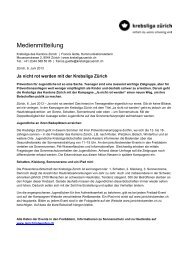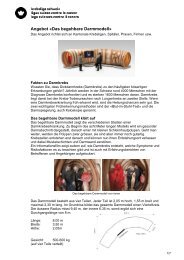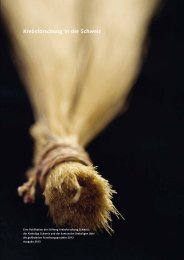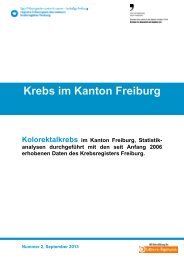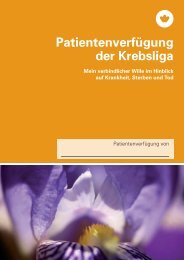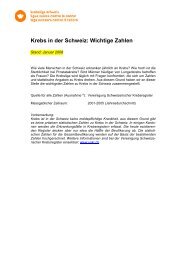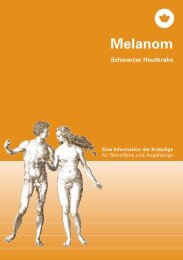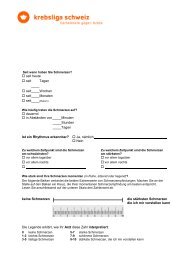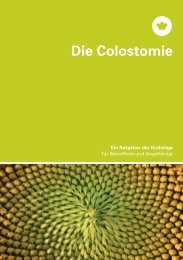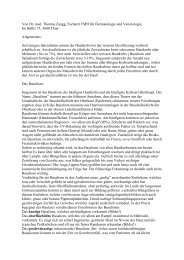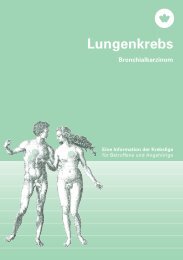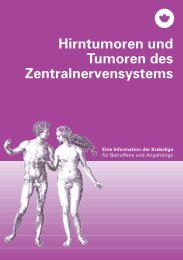Cancer Research in Switzerland - Krebsliga Schweiz
Cancer Research in Switzerland - Krebsliga Schweiz
Cancer Research in Switzerland - Krebsliga Schweiz
Create successful ePaper yourself
Turn your PDF publications into a flip-book with our unique Google optimized e-Paper software.
202<br />
Epidemiological research<br />
Presentation of approved research projects <strong>in</strong> 2009/2010<br />
Bordoni Andrea | Indicators of quality of cancer care<br />
<strong>in</strong> Southern <strong>Switzerland</strong> (KFS 02668-08-2010)<br />
Duration: 01.01.2011– 01.01.2014<br />
Study design<br />
A prospective descriptive population-based study conducted<br />
<strong>in</strong> a three-year time period at Tic<strong>in</strong>o <strong>Cancer</strong> Registry.<br />
Aims<br />
To identify a panel of specific quality of cancer care<br />
(QoCC) <strong>in</strong>dicators concern<strong>in</strong>g three cancers (colorectal,<br />
prostate, ovary/uterus), so as to assess the quality of the<br />
diagnostic and therapeutic process offered <strong>in</strong> Canton<br />
Tic<strong>in</strong>o; to promote a culture of QoCC among health care<br />
providers; and to obta<strong>in</strong> improved patient outcomes <strong>in</strong> the<br />
long term.<br />
Methods<br />
Specific project research boards will be formed for each<br />
type of tumour and the <strong>in</strong>dicators identified will refer to<br />
all <strong>in</strong>cident cases occurr<strong>in</strong>g from 2011–2013 <strong>in</strong> Canton Tic<strong>in</strong>o.<br />
Potential patient benefit<br />
All <strong>in</strong>cident patients resident <strong>in</strong> Canton Tic<strong>in</strong>o accord<strong>in</strong>g<br />
to the <strong>in</strong>habitants control database and diagnosed from<br />
2011–2013, regardless of age, will be <strong>in</strong>cluded. We expect<br />
to collect <strong>in</strong>formation for 220, 240 and 70 patients per<br />
year with colorectal, prostate and ovarian/uter<strong>in</strong>e cancers,<br />
respectively (for a total number of 1,590 cases for<br />
the 3-year study period).<br />
Project coord<strong>in</strong>ator<br />
Dr. Andrea Bordoni<br />
Registro cantonale dei tumori<br />
Istituto cantonale di patologia (ICP)<br />
Via <strong>in</strong> Selva 24<br />
CH-6601 Locarno<br />
Phone +41 (0)91 816 08 23<br />
Fax +41 (0)91 816 08 29<br />
andrea.bordoni@ti.ch<br />
Bouchardy Christ<strong>in</strong>e | Impact of genetic factors <strong>in</strong><br />
breast cancer occurrence, treatment and outcome us<strong>in</strong>g<br />
population-based data from the first Familial breast<br />
cancer registry <strong>in</strong> <strong>Switzerland</strong> (KFS 02544-02-2010)<br />
Duration: 01.08.2010 – 01.08.2012<br />
Breast cancer is a public health priority <strong>in</strong> <strong>Switzerland</strong>.<br />
Family history is one of the major risk factors for breast<br />
cancer. To perform <strong>in</strong>novative studies on the effect of hereditary<br />
factors on breast cancer occurrence and outcome,<br />
we set up the first and unique Familial breast cancer<br />
registry <strong>in</strong> <strong>Switzerland</strong>, which currently conta<strong>in</strong>s<br />
validated family histories of cancer for more than 6,000<br />
patients.<br />
Objectives of the study<br />
The objectives of our study are to compare pathological<br />
characteristics of cancers occurr<strong>in</strong>g <strong>in</strong> the same family and<br />
to evaluate the concordance of prognosis between firstdegree<br />
relatives with breast cancer.<br />
Methods<br />
We will compare tumour characteristics between women<br />
with breast cancer belong<strong>in</strong>g to the same family, and<br />
<strong>in</strong>vestigate whether the mother or sister’s prognosis <strong>in</strong>fluences<br />
the patient’s prognosis.<br />
Potential patient benefit<br />
These studies will allow to a better understand<strong>in</strong>g of the<br />
genetic factors <strong>in</strong>fluenc<strong>in</strong>g disease prognosis and make it<br />
possible <strong>in</strong> the near future to improve surveillance and<br />
care of women with high risk breast cancer.<br />
Project coord<strong>in</strong>ator<br />
Prof. Dr Christ<strong>in</strong>e Bouchardy<br />
Registre genevois des tumeurs<br />
Institut de médec<strong>in</strong>e sociale et préventive<br />
Département de médec<strong>in</strong>e et santé communautaire<br />
Université de Genève<br />
Bd de la Cluse 55<br />
CH-1205 Genève<br />
Phone +41 (0)22 379 49 50<br />
christ<strong>in</strong>e.bouchardymagn<strong>in</strong>@unige.ch<br />
Clough-Gorr Kerri | The Swiss National Cohort (SNC)<br />
and the National Institute for <strong>Cancer</strong> Epidemiology and<br />
Registration (NICER) – <strong>Cancer</strong> Epidemiology Study,<br />
1990–2008 (KFS 02553-02-2010)<br />
Duration: 01.10.2010 – 01.10.2013<br />
Objective<br />
To answer critical questions related to the burden of cancer<br />
<strong>in</strong> <strong>Switzerland</strong>.<br />
Methods<br />
The study population <strong>in</strong>cludes the census-based population<br />
of Swiss adults (≥ age 20) liv<strong>in</strong>g <strong>in</strong> NICER cancer registry<br />
areas (Appenzell, Basel, Geneva, Glarus, Graubünden,<br />
Neuchâtel, St Gallen, Tic<strong>in</strong>o, Valais, Vaud, Zurich). Participants<br />
are followed forward <strong>in</strong> time 1990–2008 with up to<br />
18 years of follow-up for cancer outcomes. Information<br />
will be collected on <strong>in</strong>cidence, survival, prevalence of cancer,<br />
and socio-demographic, lifestyle and geo-cultural<br />
characteristics.<br />
Aims:<br />
1) Exam<strong>in</strong>e gender-specific trends <strong>in</strong> cancer outcomes.<br />
2) Evaluate gender-specific socio-demographic factors<br />
associated with cancer outcomes.<br />
3) Identify gender-specific lifestyle factors associated<br />
with cancer outcomes.<br />
4) Create a multi-<strong>in</strong>stitution multidiscipl<strong>in</strong>ary research<br />
board to promote cancer epidemiology research based<br />
on the SNC-NICER study platform.




